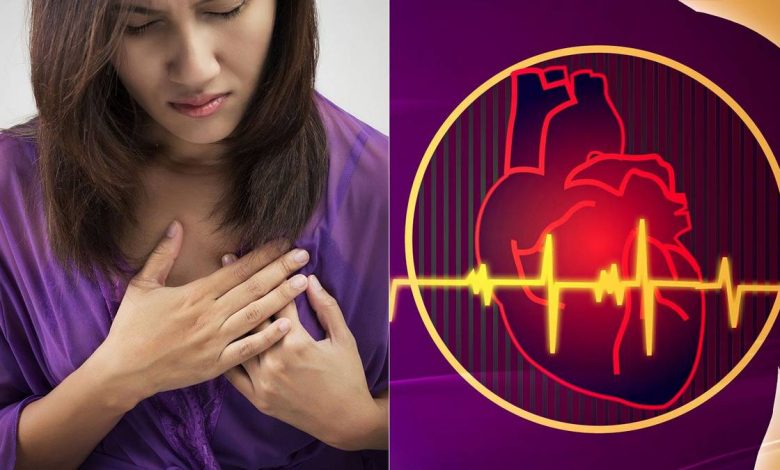Cardiopalmus: What's it, causes, symptoms, diagnostics, treatment, prevention

Heart palpitations; Heartbeat sensations; Irregular heartbeat; Palpitations; Heart pounding or racing
What is palpitations?
Rapid heartbeat means an irregular or strong heartbeat, which can be felt in the chest, neck or throat. It can be described as a fluttering or thumping sensation, and it can last from a few seconds to several minutes. Although heart palpitations are usually harmless, it may be a symptom of an underlying heart disease, also cause anxiety and stress.
Causes of palpitations
A fast heartbeat can be caused by a variety of factors., including:
- stress and anxiety. Emotional stress and anxiety can trigger the release of adrenaline and other stress hormones., which can affect the heart rate and rhythm.
- Physical activity. Vigorous exercise or strenuous exercise can cause an increase in heart rate and rhythm.
- Caffeine and nicotine. The use of caffeine and nicotine can cause an increase in heart rate and rhythm.
- Disease. Some diseases, such as thyroid problems, anemia, low blood sugar and electrolyte imbalances, can cause heart palpitations.
- Heart disease. Heart disease, such as atrial fibrillation, atrial flutter and ventricular tachycardia, can cause heart palpitations.
Heart palpitations symptoms
Heart palpitations symptoms can vary from person to person, and they may include:
- Feeling in awe, punches in the chest, neck or throat.
- Feeling nauseous or dizzy
- Shortness of breath or difficulty breathing
- Pain or discomfort in the chest
- Fainting or near fainting
When to see a doctor
If you are experiencing heart palpitations, that is accompanied by any of the following symptoms, you should contact your doctor immediately:
- Pain or discomfort in the chest
- Swoon
- Shortness of breath or difficulty breathing
- Dizziness or lightheadedness
- Sweating
Questions, that your doctor may ask
When you see your doctor about a fast heartbeat, he may ask you a series of questions, to determine the cause of your symptoms. Some questions, which the doctor may ask, include:
- When did you first notice your heart palpitations?
- How often do you experience heart palpitations?
- Are you experiencing any other symptoms, such as chest pain or shortness of breath, when you have heart palpitations?
- Have you had a history of heart disease or other medical conditions?
- Do you use caffeine, tobacco or alcohol?
Heart palpitations diagnosis
To diagnose palpitations, the doctor may conduct a physical examination and order a series of tests, which may include:
- Electrocardiogram (ECG). This test records the electrical activity of your heart and can help your doctor determine, are there any abnormalities in your heart rate.
- Holter Monitor. This is a portable device, which records your heart activity over a period of time, usually from 24 to 48 hours.
- Echocardiogram. This test uses sound waves to create an image of your heart., and it can help your doctor determine, are there any structural abnormalities in your heart.
- Blood test. Blood tests can help your doctor determine, are there any comorbidities, which can cause heart palpitations.
Treating heart palpitations
Treatment for palpitations will depend on the underlying cause of your symptoms.. If palpitations are caused by stress or anxiety, your doctor may recommend relaxation techniques, such as deep breathing exercises, yoga or meditation. If your heart palpitations are caused by a medical condition, eg, thyroid problems or anemia, the doctor may recommend medications to treat the underlying condition.
In some cases, if the palpitations are caused by an abnormal heart rhythm, your doctor may recommend procedures to correct your rhythm. These procedures may include:
- Kardioversija. This procedure, in which electrical shocks are used to restore the heart rhythm.
- Ablation. This procedure, in which heat or cold energy is used to destroy tissue in the heart, causing an abnormal rhythm.
- Kardiostimuljator. This device, which is implanted under the skin and sends electrical signals to the heart, helping regulate his heartbeat.
Home treatment for heart palpitations
There are several things, which you can make at home, to prevent heart palpitations, including:
- Avoidance of caffeine, tobacco and alcohol.
- Reducing Stress and Anxiety Through Relaxation Techniques
- Healthy eating
- Regular exercise.
- Adequate sleep
Prevention of heart palpitations
To prevent heart palpitations, it is important to lead a healthy lifestyle. It includes:
- Eating a healthy diet low in fat and cholesterol.
- Regular exercise.
- Adequate sleep
- Limiting caffeine intake, tobacco and alcohol.
- Reducing Stress and Anxiety Through Relaxation Techniques
- Taking medicines prescribed by a doctor
Conclusion
A racing heart can be a frightening experience., but it's usually harmless.. But, if you are experiencing heart palpitations, accompanied by chest pain, shortness of breath or fainting, you should contact your doctor immediately. Maintaining a healthy lifestyle and working with a physician to treat any underlying conditions, you can help prevent heart palpitations in the future.
Used sources and literature
Fang JC, O'Gara PT. History and physical examination: an evidence-based approach. In: Zipes DP, Libby P, Bonow RO, Mann DL, Tomaselli GF, Braunwald E, eds. Braunwald’s Heart Disease: A Textbook of Cardiovascular Medicine. 11th ed. Philadelphia, PA: Elsevier; 2019:chap 10.
Miller JM, Tomaselli GF, Zipes DP. Diagnosis of cardiac arrhythmias. In: Zipes DP, Libby P, Bonow RO, Mann DL, Tomaselli, GF, Braunwald E, eds. Braunwald’s Heart Disease: A Textbook of Cardiovascular Medicine. 11th ed. Philadelphia, PA: Elsevier; 2019:chap 35.
Take JE. Approach to the patient with suspected arrhythmia. In: Goldman L, Schafer AI, eds. Goldman-Cecil Medicine. 26th ed. Philadelphia, PA: Elsevier; 2020:chap 56.
